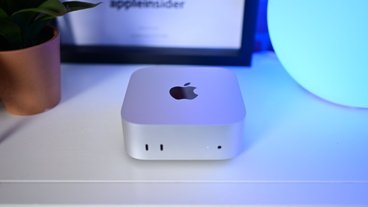Apple has reportedly set an industry record by moving its OpenCL parallel computing standard from its beginnings to imminent approval in half a year, paving the way for its inclusion in Mac OS X Snow Leopard.
Khronos' presentation from the event now shows that the first feature-complete edition of OpenCL (Open Compute Language) was submitted for ratification in October, or just four months after it was first proposed alongside the unveiling of Snow Leopard. The operating system will use the technology to accelerate general-purpose tasks using both individual processor cores as well as video chipsets inside its systems.
The group's chief, NVIDIA executive Neil Trevett, also suggests through statements that the total development time for OpenCL was unusually quick as a whole. A timeline provided by the organization shows Apple having worked on the initial proposal with AMD, Intel and NVIDIA in an undetermined amount of time before the June unveiling, but Trevett himself indicates that the total time involved was just six months — unprecedented speed for a certification process often known more for the caution involved.
“If you go to some other larger standards bodies, it’s quite normal for a standard to take five years or more,†he explains. “That’s quite commonplace. You actually have to really push to get it down to eighteen months. Our record was [twelve] months, up to now; we’ve done this one in six.â€
Much of the rapidity is directly attributed to Snow Leopard. For Intel, the prospect of seeing OpenCL already in a shipping operating system for 2009 has been a strong lure. Employees have "divorced [their] families" and worked extreme levels of overtime to complete a draft that many said would be "impossible," according to the chipmaker's Tim Mattson.
But while congratulating themselves for their accelerated work, neither Apple nor the other standard developers have yet to outline how OpenCL will specifically benefit Macs.
At present, NVIDIA's vendor-specific equivalent language, CUDA, is used primarily to speed up data and scientific calculations by using the generalized nature of GeForce video hardware alongside the main CPU. OpenCL will at a minimum open this to AMD's ATI Radeon hardware, but isn't yet known to be addressing any specific roles in Mac OS X. Mattson notes that it can often be used for processing physics, such as those found in games.
It's also said that OpenCL can scale down to smaller devices, including smartphones, as long as the processor or graphics chipset are capable of supporting this kind of acceleration.
As quickly as the standard has gone through industry checks, however, Apple and Khronos both have a pair of additional steps to undertake before their format is entirely ready. The individual vendors will first have to sign off on the completed draft and suggest changes as necessary, after which a specification can reach the public; later, Khronos will also introduce some tests to ensure that hardware and software developers properly follow the standard.
No timeline has been supplied for when these would take place, though the ratification will take a minimum of 30 days to finish. This would nonetheless give Apple enough time to include OpenCL for both the official mid-2009 release window for Snow Leopard as well as the rumored early schedule.
 Katie Marsal
Katie Marsal






-m.jpg)






 Charles Martin
Charles Martin
 Christine McKee
Christine McKee
 Wesley Hilliard
Wesley Hilliard
 Malcolm Owen
Malcolm Owen
 Andrew Orr
Andrew Orr
 William Gallagher
William Gallagher
 Sponsored Content
Sponsored Content








17 Comments
...but Trevett himself indicates that the total time involved was just six months -- unprecedented speed for a certification process often known more for the caution involved.
guess in that certification process they were playing Steve's favorite song by Devo, "Whip It"... "Crack that whip..."
This is just the standard, but I can't wait to see this and Grand Central in action. I expect that we'll see some SL flattering comparisons demoed by Jobs and his posse in 7 weeks.
The group's chief, NVIDIA executive Neil Trevett, also suggests through statements that the total development time for OpenCL was unusually quick as a whole.
It's all done with GPUs now so it's about 10 times quicker.
A timeline provided by the organization shows Apple having worked on the initial proposal with AMD, Intel and NVIDIA in an undetermined amount of time before the June unveiling, but Trevett himself indicates that the total time involved was just six months -- unprecedented speed for a certification process often known more for the caution involved.
This is what happens when you deal with industry pushing companies like GPU companies. Maybe Intel should get them to handle all the USB 3 stuff too.
Reasons that I think the developments needs to get out sooner rather than later is that apps need to be changed to take advantage of the improvements and these improvements are huge. Being able to accelerate video encoding by a factor of 2, some things by a factor of 10. This is just an unprecedented performance jump and would take well over 2 years to do in a normal hardware cycle.
If it's going to take a while before developers know how to develop the apps properly then the APIs need to be in place ASAP. WWDC can focus on teaching devs how to use it.
As the presentation from the unix guy had said, 'forget everything you know about multi-threaded computing (turns out developers didn't know that much anyway)' - funny but also quite true. Parallel computing is the way forward. Hardware has dictated that and developers need to make the transition.
I can't wait to get to play with these libraries. OpenCL sounds like a dream.
I think it's interesting the way he put to forget about multi-threading. I figured they would have a lot in common. I guess we'll have to wait and see?
Sweet, Can't wait for SL. Thank goodness I own a SR MBP, it will be able to take advantage of OpenCL, I'm not sure if intel GMAs will be able to harness the power of OpenCL?